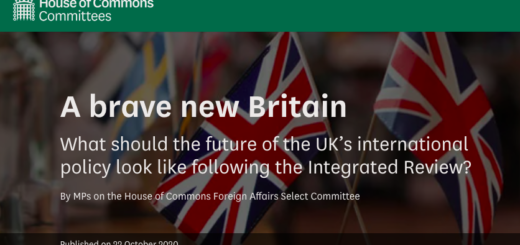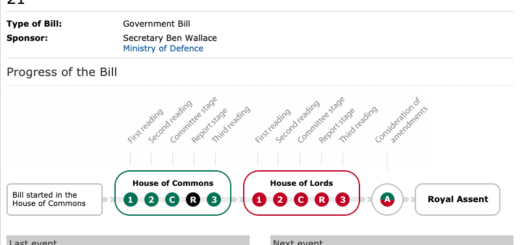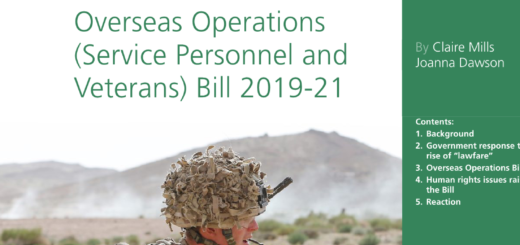Undermining soldiers’ protections, international law and victims’ access to justice
On Wednesday last week, Parliament saw the second reading of the Overseas Operations (Service Personnel and Veterans) Bill. Parliamentarians from across the political spectrum have engaged on the Bill, with 70 members of Parliament signing up to speak at the reading.
The Bill aims to stop repeated investigations and prosecutions of troops for alleged unlawful conduct overseas. The reading saw MPs from all parties support the spirit of the bill, - “No one deserves to be subject to vexatious allegations” - but significant concerns were raised about its wording and effects. Most significant of these were the bill’s failure to address the root cause of reinvestigations and prosecutions, namely flawed investigations at the initial time of an allegation; the undermining of international law and protections, including the absolute prohibition against torture, and; its six year absolute long-stop, which will limit soldiers’ and victims’ access to accountability and redress and undermine an essential mechanism for identifying structural flaws within the MOD that compromises the security of soldiers and civilians alike.
The bill does not solve the problem of reinvestigations and prosecutions
Dan Jarvis MP (Lab), a veteran, wrote in Politics Home: “Through this bill, the Government is seeking to right a wrong but not by addressing the root cause of the issue.” Rather, the problem is “the serious failings in the system of investigating allegations”, as emphasised by Stephen Morgan MP (Lab), Stewart McDonald MP (SNP), John Healey MP (Lab) both Spokespeople for Defence, Dr. Julian Lewis MP (Independent) Chair of the Intelligence and Security Committee and former Chair of the Defence Committee, Dan Jarvis MP (Lab), Carol Monaghan MP (SNP) and Lloyd Russell-Moyle MP (Lab), to name a few.
“At first glance, the government’s answer to ending vexatious legal action against our veterans seems compelling. No one - whether they served in the military or otherwise - deserves to be repeatedly investigated without good cause,” Dan Jarvis MP wrote in his article. However, as stated by Julian Lewis MP during the second reading, “the primary problem is not repeated prosecution, but repeated reinvestigation…The Bill does little to rule that out.” The Bill’s inability to address the problem of flawed investigations (leading to reinvestigations) has similarly been identified by the former Attorney General to Northern Ireland, John Larkin QC, though he supports the bill as it stands.
Several members referenced an interview last year in which now People and Veterans Minister Johnny Mercer MP said that one of the biggest problems was: “the military’s inability to investigate itself properly and the standard of those investigations. If those investigations were done properly and self-regulation had occurred, we probably wouldn’t be here today.” Following on from this, Dan Jarvis MP emphasised the importance of understanding “the underlying problem,” namely, flawed investigations, which “is how we have ended up at this point.” Yet nowhere in the Bill is the need to “review how military investigations are conducted” mentioned. “If we had a credible investigatory system that dealt with allegations in an effective, impartial and timely manner—one that allowed us to refer back with confidence—we would not be in the position that we are in now,” the veteran argued.
The solution: independent, timely, robust and comprehensive investigations
In attempts to understand the scale of vexatious claims made against soldiers and veterans, a number of speakers, including Carol Monaghan MP (SNP) and Kevan Jones MP (Lab), repeated unanswered requests for more data on the number of claims made. In a recent article, Bell Riberio-Addy MP (Lab) stated that “there have been few prosecutions and even fewer convictions, with the director of the Service Prosecution Authority (SPA) ruling out further legal action against accused soldiers who served in Iraq and Afghanistan in all but one case. There have been just seven prosecutions arising from the Iraq war.”
The problem, MPs argued, lies before the prosecutorial stage, with investigations. It is essential that the solution is informed by a comprehensive understanding of all the data/facts. “To put the matter in perspective, certainly some vexatious claims have been lodged and the current system has taken too long to weed them out, but the bigger, more serious, more consistent problems lie in the system of investigations, which lacks speed, soundness, openness and a duty of care to alleged victims and to the forces personnel who may be in the frame. Those are the problems, which occur well before the point of decision about prosecution, which is the point at which the Bill starts to operate. They are what the Bill should and can deal with. Our aim during its passage through Parliament is to help ensure that it does,” John Healey MP (Lab) Shadow Secretary of State for Defence said.
On 18 September, Chief of Defence Staff Gen. Sir Nicholas Carter when addressing industrial claims said: “the way to address that may be counter-intuitive, but we need to be better at investigating the claims when they’re made. We need to put greater capacity inside our system to make sure that investigations are more effective. We Need to do them more quickly and in order to do that, we have to keep much better operational records so that we can be absolutely transparent, so our soldiers are protected.”
This was echoed by Former Officer and Head of NATO Civilian Casualty Mitigation, Afghanistan, Mark Goodwin-Hudson on 28 September, during an oral evidence session on the Bill at the Joint Committee on Human Rights:
“(The) ability to conduct accurate and timely investigations in theatre is the best means to … addressing allegations against soldiers…the absence of a form of conducting meaningful investigations is one of my problems with this bill”.
Undermining international law and the absolute prohibition against torture
Claudia Webbe MP (Lab), Joanna Cherry MP (SNP), Alastair Carmichael MP (Lib Dem) raised significant concerns about the Bill’s effect on the international order, undermining essential legal frameworks the UK has participated in creating and championed to uphold, such as the absolute prohibition on torture and the Geneva Conventions. Members questioned why the Bill’s list of exceptions did not include the most serious crimes under international law. “[P]reventing acts of torture is not some burdensome red tape. The UK military has opposed torture for decades, and that principle is enshrined in the Army field manual and the Ministry of Defence doctrine,” Claudia Webbe MP emphasised. However, if a claim that would otherwise be investigated is prevented from proceeding based on the presumption against prosecution after five years, the UK clearly risks breaching its “long-standing international obligations” as argued by John Healey MP during the debate. Echoing the warnings of Judge Advocate General for the Armed Forces Blackett, he stated that “rather than providing relief for the troops accused, the Bill also risks British service personnel being dragged to The Hague, the court of Milošević and Gaddafi, instead of being dealt with in our own British justice system.”
Reverend Nicholas Mercer, former Command Legal Advisor, UK 1st Armoured Division, Iraq War, has warned that the Bill could encourage other states to pass similar legislation. This, not only could undermine the safety of UK soldiers detained overseas, as argued by Claudia Webbe MP, but could contribute towards the weakening of the established international order upon which UK security and prosperity rests.
Civil claims long-stop: undermining soldiers’ and victims’ protection and MOD scrutiny
The civil claims long-stop prevents claims against the MOD as an institution from being made by soldiers and victims.
The Government has identified its wish to protect service personnel from prosecutions as the driving force behind the Bill. However, several Members, including Carol Monaghan MP (SNP), Claudia Webbe MP (Lab) and Stephen Morgan MP (Lab) stating “the main beneficiary of this Bill is the MOD, not our personnel”. Citing statistics, John Healey MP outlined how in the past 15 years “25 cases [have been] brought by injured British troops against the MOD for every one case brought by alleged victims against our troops. You can see why, Madam Deputy Speaker, some of the veterans I have talked to about this Bill reckon it is more about protecting the MOD than it is about protecting troops.” Specifically, the Bill’s second part undermines personnels’ access to redress and “breaches the armed forces convention by preventing British armed forces personnel from holding the Ministry of Defence to account for negligence, personal injury or death” as by Claudia Webbe MP (Lab) and John Healey MP (Lab).
The civil claims long-stop will also prevent civilians from bringing (human rights act) claims against the MOD as an institution. This is very problematic, because, as shown in HMG’s impact assessment, 95% are unable to bring a claim within three years and 62% within six years. Considering this data, the six-year absolute time limit will limit their access to accountability, justice and redress. Carol Monaghan MP (SNP) said: As we know, many conflicts involving our personnel are in parts of the world that are now experiencing a fragile peace. To put in place a statute of limitations on prosecutions assumes that normality and the structures of a democratic society will be promptly established post conflict. This, of course, is not the case. If we are to rely on investigations that have taken place, we must have confidence in those original investigations.” The time it can take to bring about justice was emphasised (and exemplified through the Mau Mau case, in which the process of justice took more than 50 years) during the Joint Committee on Human Rights oral evidence session into the Bill, by witnesses Martyn Day (Partner at Leigh Day), Reverend Nicholas Mercer (former Command Legal Advisor, UK 1st Armoured Division, Iraq War), Elizabeth Wilmshurt CMG (Distinguished Fellow, Chatham House) and Mark Goodwin-Hudson (former British Army Officer and head of the NATO Civilian Casualty Investigation and Mitigation Team in Afghanistan in 2016).
Civil claims are essential to identify and investigate structural and institutional flaws in MOD policy and practice that puts soldiers and civilians overseas at risk. However, the long-stop will prevent claims and subsequent investigations after six years. “Personal injury claims are important not only in securing justice, but in holding the MOD to account. The unsuitability of Snatch Land Rovers would never have come to light if it had not been for bereaved families pursuing claims against the MOD” said Carol Monaghan MP (SNP).




